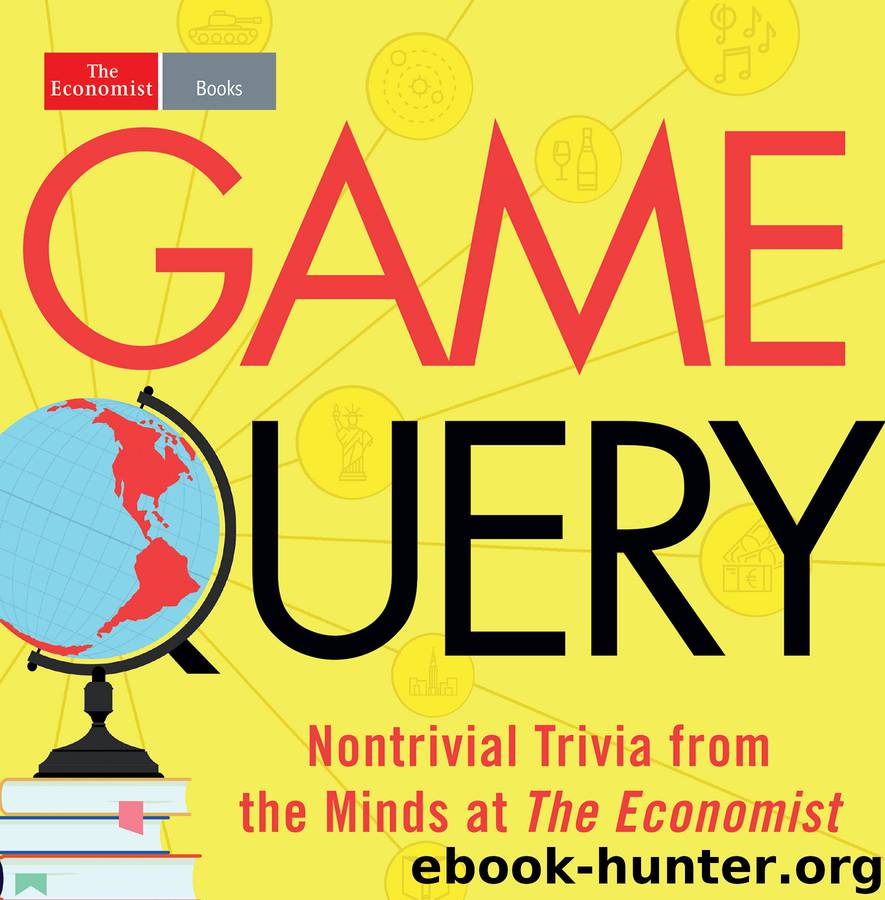Game Query by Philip Coggan & Josie Delap & Geoffrey Carr & John Prideaux & Simon Wright

Author:Philip Coggan & Josie Delap & Geoffrey Carr & John Prideaux & Simon Wright
Language: eng
Format: epub
Publisher: PublicAffairs
Published: 2018-07-30T16:00:00+00:00
TO UR IS HUMAN: Middle East and Africa
1. Its 1.2 billion inhabitants represent about one-sixth of the world’s population. While population growth has slowed in much of the world, Africa is projected to see a slight acceleration in its growth in the immediate future.
2. Saudi Arabia which in 2016 produced 12.3 billion barrels a day.
3. a) Ghana b) Botswana c) Swaziland d) Sao Tome and Principe e) Eritrea.
4. About 2,000. They include English, French, Arabic, Xhosa, Swahili, Yoruba, Igbo, Zulu and Shona.
5. Flowers. Kenya is the world’s third-largest producer of cut flowers and the crop is its second-largest export, after tea.
6. The British and French governments respectively appointed them in 1916 to apportion the lands of what had been the Ottoman Empire, and which now form much of the modern Middle East.
7. Bahrain, Iran and Iraq. They also form the plurality (but not the majority) in Lebanon. Beyond the Middle East, Azerbaijan is also a Shia-majority country.
8. a) the base or foundation b) the awakening c) youth.
9. Syria, Iran, Iraq and Turkey. The Kurds run the semi-autonomous region of northern Iraq but still dream of an independent Kurdistan.
10. It is the home of Jacob Zuma, South Africa’s fourth president since independence, and the location of his private estate on which he has lavished $24 million, much of it public money, on among other things an amphitheatre, a swimming pool and a cattle enclosure.
11. Cairo, in Arabic “um al-dunya”.
12. 1962.
13. In the Tunisian town of Sidi Bouzid where a young man, Muhammad Bouazizi, set himself on fire, sparking the protests and the uprising that brought down the regime of Zine el-Abidine Ben Ali.
14. The Iranian government of Mohammad Mossadegh, in a coup orchestrated by America and Britain. They were worried, among other things, about the enthusiasm of the prime minister, who was democratically elected, when it came to the nationalisation of Iran’s oil.
15. Maronite Christian, Sunni Muslim and Shia Muslim. Lebanon’s democracy rests on a division of power between its 17 officially recognised religious “sects”.
16. Oslo in 1993. The Oslo Accords laid out a peace process between the two sides and marked the first time that they officially recognised each other.
17. South Sudan, which gained independence from Sudan in 2011 and whose creation marked the end of Africa’s longest-running civil war.
18. Naguib Mahfouz, a Egyptian writer, known for his great novels such as the Cairo Trilogy.
19. It was the number assigned to Nelson Mandela during his 27 years of imprisonment on Robben Island.
20. It rebased its GDP, leading to an 89% increase overnight. Sceptics might worry about such a leap, but in fact it was the old figures that were dodgy.
21. The assassination of Anwar Sadat. Mr Mubarak ruled for three decades before he was overthrown in the Egyptian revolution of 2011.
22. Egypt (known then as the United Arab Republic), Jordan and Syria.
23. The 1920s in Egypt. It was established by Hassan al-Banna, a school teacher, and has since spread throughout the Middle East.
24. They are the sites of Iran’s two uranium enrichment facilities.
Download
This site does not store any files on its server. We only index and link to content provided by other sites. Please contact the content providers to delete copyright contents if any and email us, we'll remove relevant links or contents immediately.
Periodization Training for Sports by Tudor Bompa(7327)
The MacArthur Bible Commentary by John MacArthur(4236)
The Body: A Guide for Occupants by Bill Bryson(3799)
The Sports Rules Book by Human Kinetics(3588)
What It Really Takes to Get Into Ivy League and Other Highly Selective Colleges by Hughes Chuck(3220)
Marijuana Grower's Handbook by Ed Rosenthal(3117)
The Sprouting Book by Ann Wigmore(3052)
Salt, Fat, Acid, Heat: Mastering the Elements of Good Cooking by Nosrat Samin(2658)
The Martian by Andy Weir(2609)
Classic by Mary Berry(2501)
The Bread Bible by Rose Levy Beranbaum(2470)
Harry Potter 4 - Harry Potter and The Goblet of Fire by J.K.Rowling(2416)
The Marketing Plan Handbook: Develop Big-Picture Marketing Plans for Pennies on the Dollar by Robert W. Bly(2413)
Sapiens and Homo Deus by Yuval Noah Harari(2412)
Martha Stewart's Baking Handbook by Martha Stewart(2330)
50 Economics Classics by Tom Butler-Bowdon(2066)
Screenplay: The Foundations of Screenwriting by Syd Field(2056)
The Cambridge Grammar Of The English Language by Rodney Huddleston Geoffrey K. Pullum(2046)
The Plant Paradox by Dr. Steven R. Gundry M.D(2038)
